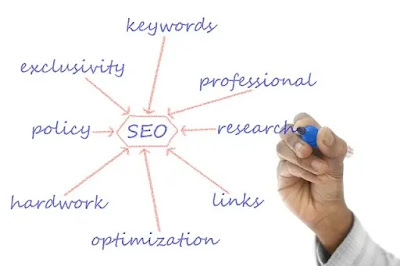Some SEO myths are debunked repeatedly and yet they never seem to die. For example, you hear all the time that 'Content is king' and this is not completely untrue. However, good content by itself is not enough.
You also need to follow best SEO practices, such as on-page SEO strategy, internal linking, image optimization, and more. Here are some other common SEO myths.
Keyword density refers to the number of times you use a keyword on a page. When a search engine like Google first sees a keyword, it weights it. If it looks a second time, it recognizes that the page is about a certain subject.
However, if the keyword is mentioned repeatedly, you are at risk of spamming and it can harm your ranking. It is important to include keywords, but they should not be artificially sound and your copy should flow smoothly.
Obviously, if you have a new website, you need to go after long-tail, low-volume keywords instead of competing high-volume ones.
If a link is unnatural or it comes from an unrelated site or page, it will not help you rank. You still need backlinks but they have to be valid and relevant if you want them to help you rank.
Backlinks should be relevant and come from high quality websites. If you have a website about garden tools and you get a backlink from a site that sells shoes, then this is not going to help you. Get a backlink from one of the top sites selling garden tools and that's another story.
Also Read:- Solid Tips to Make SEO Work for You
If your site's pages are properly linked, Google will usually search your site even if you don't have a sitemap. However, in most cases, having a sitemap on your site will benefit.
The myth is that people have very little attention and therefore you should only write posts of about 300 to 500 words. This can ensure that people read your entire post but it does not make sense for SEO purposes.
Research on the co-schedule shows that the best-performing posts on Google are between 1500 and 2200 words. Google wants comprehensive content that provides the best answer to a specific search query.
This is why you need great writers, such as essay writing service, who knows the art of creating the right content that can rank you and bring you traffic.
Just writing long content does not necessarily give you a high rank. Your content is not judged on its length, but how well it responds to search queries. Long, misleading, inconsistent posts that respond to search queries do not rank well.
Use only professional, expert writers to manage your content. Experts know how content optimization is done and how it works. Small tricks make a lot of difference
and that is why they are the best people to handle it. Hire top authors or essay writers from a custom essay to go through EduBirdie reviews to help you with your writing needs.
What works for another site may not work for you. Large websites suffer less when found wrong. You do not want to make decisions for your website based on every step,
Your users may have different intentions and different questions. Find out what works best for your site and stick to it. If you A / B test an idea, the data will show what works best for you.
There is a fine when you violate the webmaster guidelines. In this case, you will get a message in Google Search Console and you can find out why your site has been devalued.
This may improve your ranking. However, your website is not ranked highly by Google simply because you use their AdWords service.
 |
| SEO myths |
You also need to follow best SEO practices, such as on-page SEO strategy, internal linking, image optimization, and more. Here are some other common SEO myths.
1. Keyword density plays a major role in ranking
 |
| Keyword Density |
Keyword density refers to the number of times you use a keyword on a page. When a search engine like Google first sees a keyword, it weights it. If it looks a second time, it recognizes that the page is about a certain subject.
However, if the keyword is mentioned repeatedly, you are at risk of spamming and it can harm your ranking. It is important to include keywords, but they should not be artificially sound and your copy should flow smoothly.
2. You don’t need to do keyword research
It is a misconception that if you produce great content, you do not have to worry about keywords. If you want to rank on that first page of search results, then you have to produce content based on people's search queries.Obviously, if you have a new website, you need to go after long-tail, low-volume keywords instead of competing high-volume ones.
3. Backlinks are dead
In the past a popular way to create backlinks was to publish articles on article directories with a website URL link. The other way was to buy backlinks. Since these links were generally of low quality, these were not best practice.If a link is unnatural or it comes from an unrelated site or page, it will not help you rank. You still need backlinks but they have to be valid and relevant if you want them to help you rank.
4. You need a large number of backlinks
On days where the number of links pointing back to your site was more important than their quality. Instead of paying attention to how many backlinks you can get, you need to pay attention to their quality.Backlinks should be relevant and come from high quality websites. If you have a website about garden tools and you get a backlink from a site that sells shoes, then this is not going to help you. Get a backlink from one of the top sites selling garden tools and that's another story.
Also Read:- Solid Tips to Make SEO Work for You
5. You don’t need a sitemap
For humans, it is easy to type in a search query and find what they are looking for. For a machine, it is complicated. Sitemaps provide information about your site's pages, and how they relate to each other. Google reads a sitemap to find content it might not otherwise find. Google ranks not only your website but also your web pages.If your site's pages are properly linked, Google will usually search your site even if you don't have a sitemap. However, in most cases, having a sitemap on your site will benefit.
6. Write only short content
Research on the co-schedule shows that the best-performing posts on Google are between 1500 and 2200 words. Google wants comprehensive content that provides the best answer to a specific search query.
This is why you need great writers, such as essay writing service, who knows the art of creating the right content that can rank you and bring you traffic.
7. Write only long content
Use only professional, expert writers to manage your content. Experts know how content optimization is done and how it works. Small tricks make a lot of difference
and that is why they are the best people to handle it. Hire top authors or essay writers from a custom essay to go through EduBirdie reviews to help you with your writing needs.
8. If the big brands do it, it must be right
What works for another site may not work for you. Large websites suffer less when found wrong. You do not want to make decisions for your website based on every step,
Your users may have different intentions and different questions. Find out what works best for your site and stick to it. If you A / B test an idea, the data will show what works best for you.
9. Algorithm evaluations are the same as penalties
Google keeps updating its algorithms but not every site is devalued as a result of these processes. One can also see some positive changes.There is a fine when you violate the webmaster guidelines. In this case, you will get a message in Google Search Console and you can find out why your site has been devalued.
10. Google rewards you if you run paid AdWords campaigns
Running an AdWords campaign is different from improving your organic search results. Perhaps a Google AdWords campaign increases the flow of traffic to your website and so many people engage with your content.This may improve your ranking. However, your website is not ranked highly by Google simply because you use their AdWords service.
A final word
SEO brings you evergreen traffic and it can add up every month like recurring revenue in a business. On the downside, it can take time to see tangible results. Stop following the SEO myths, focus on good SEO strategies and your website will benefit.

















No comments:
Post a Comment